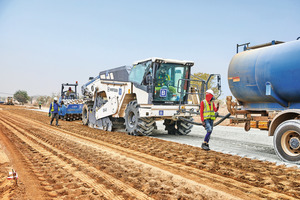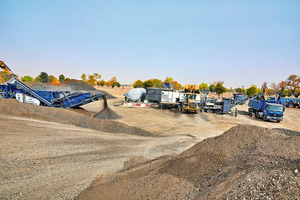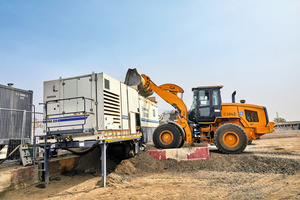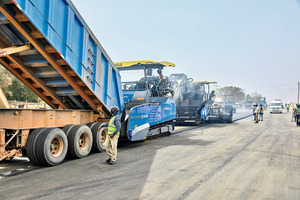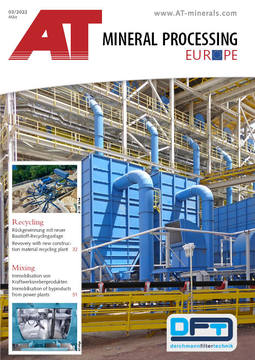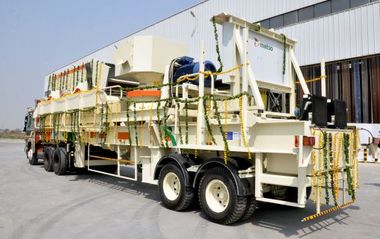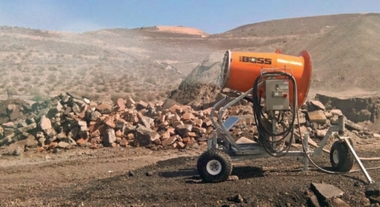The Wirtgen Group and JBN work together to deliver a part of the “Trans-African Highway”
Nigeria, Africa’s largest economy, attaches increasing importance to the utilisation of environmentally friendly technologies in the development of its infrastructure. From the beginning, the environmentally friendly cold recycling method was considered as an alternative to conventional road construction methods. The proposed use of this method was one of the factors that led to JBN winning the contract. The completion of the reconstruction project is scheduled for Q2/2023, and the completion deadline for special structures has been set for early May 2024. Despite the tight schedule, JBN is optimistic that the project can be realised as planned, thanks to the time saved by the cold in-plant recycling method.
Cold recycling with foamed bitumen – an innovation
in the Nigerian road construction sector
Depending on the application, the cold recycling process involves mixing foamed bitumen into the existing construction materials “in-place”, namely with an in situ cold recycler, or “in-plant”, with a mobile cold recycling mixing plant located close to the construction site. In the case of this mammoth project with a travelling construction site, the contractor decided that the “in-plant” method would be the best option. The newly produced bituminous mix is known as BSM (bitumen-stabilised material). After paving and subsequent compaction, BSM is characterised by long-term durability and high load bearing properties. Viewed from a long-term perspective, BSM has other advantages: the foamed bitumen which is mixed in leads to selective adhesion within the cold recycling layer and thus prevents cracking. As part of the pavement structure, the permanent layers prepared in this way form an ideal foundation for final asphalt surfacing with considerably reduced layer thicknesses or fewer layers.
Julius Berger has adopted this construction method as the best long-term solution and sees it as a real innovation in the Nigerian road construction sector: “Cold recycling enables optimal use of existing construction materials and conserves valuable resources. This is why we are the first construction company in Nigeria committed to exploiting the full potential of this technology for our company and our clients,” explains Project Director Benjamin Bott.
Two complete cold recycling and paving fleets with a total of 45 machines had already been ordered at the start of the project. These included large milling machines and soil stabilisers from Wirtgen, cold recyclers and spreaders from Streumaster, Kleemann mobile impact crushers and Wirtgen cold mixing plants, Vögele asphalt pavers and mobile feeders and rollers from Hamm. 30 more machines were shipped to Nigeria in the course of the fleet expansion, “because we have been convinced by the efficiency and durability of the machines in the past. On top of this, we had the outstanding aftersales service here in Nigeria. This plays a major role in maintaining high machine availability, and is essential for assuring the smooth running of mega-projects like this,” says Bott.
The work continued with an outstandingly low carbon footprint, even after the expansion of the project. In this sense, the benefits of the method lie primarily in the enormous potentials for saving energy in materials processing. As there is no need to dry or heat the base materials, fuel consumption can be reduced by 10 to 12 l/t in comparison with conventional rehabilitation techniques. The almost complete recycling of the surface layer corresponds to a reduction of construction material transportation needs of up to 90 %. At the same time, 90 % of the costs for resources and 100 % of material disposal costs can be saved.
This results in a significant reduction in fuel consumption and lower CO2 emissions. Above all, the cold recycling method also enables savings of up to 50 % of the binding agents required – which continues to be the largest cost factor in road rehabilitation projects. Thanks to the special properties of BSM, cold recycling technology leads to extremely low costs throughout the service life of roads – as is the case with the Abuja-Kaduna-Zaria Road in Nigeria.

